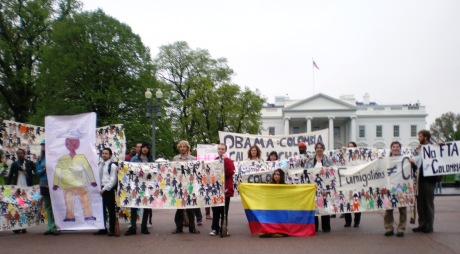There is enormous power in organizing people and organizations and numerous ways that you can organize locally to change U.S. policy towards Latin America. Local organizing is critical to educating members of your community and reminding your representatives that their positions should reflect the values of their constituents. Whether you’re already part of an established local group or are looking to start one, these resources will give you ideas for how to communicate with your fellow constituents and Congress more creatively and effectively.

- Host a speaking tour or teach-in. If you are at a school or university, ask your teachers to assist you in planning a public ” teach-in” on a Latin American issue to be held at a local town hall, place of worship, or another community space. While you may have speakers right in your community (if you or someone you know has traveled to Latin America recently, this is a great opportunity for a teach-in), there are also a number of organizations that run speaking tours around the country with visitors from Latin America.
- Set up information tables at local cultural events related to Latin America. If you have a letter to send to a member of Congress, bring copies of the letter so that people can sign and send them right there. If you have a very cooperative promoter, ask if you can make a two-minute presentation before the event begins.
- Set up an information table or have volunteers circulate with fliers and sign-up clipboards at regular community events such as farmers markets, flea markets, and street festivals. Again, if you have a letter to a member of Congress or other urgent action, make sure to bring them so that people can take action on the spot. These are opportunities to engage the local community with your issue.
- Ask local activist groups that don’t deal directly with your issue if you can speak briefly at their next meeting. If you have local chapters of Amnesty International, local immigrant organizations and other groups that could have an interest in your issue, see if you can come and speak to them about a specific action that you are working on. Most groups are more than happy to give other activists a few minutes to discuss a new topic.
- Involve your religious community in advocacy for a more just U.S. policy toward Latin America. See our Faith-Based Organizing section.
- Hold a call-in day or letter-writing day in a local community space. This technique is especially useful leading up to a major vote: members of your community can voice their concerns over a particular Latin America issue and ask their member of Congress to support a bill or amendment to help change the policy. To set up a call-in or letter-writing event, you’ll need the phone numbers and addresses of your members of Congress, and talking points on the issue for a phone call or letter. You may also want a sample letter to guide the writers. For these resources, please see Our Campaigns or visit our Action Center.
- Organize a town or city council resolution. Across the country, cities and towns are organizing council resolutions calling for foreign policies supporting peace and justice.
- Hold a rally, vigil, or parade in front of your member of Congress’ district or state office (you will need a permit, so be sure to go through the proper channels a month or so before you hold the event!). Amnesty International has some great tips on holding vigils and rallies as part of their Activist Toolkit.

